
The Mystical Depths of Škocjan Caves
Nestled in the heart of Slovenia, Škocjan Caves is a UNESCO World Heritage site that offers a journey into the mystical depths of the Earth. As one of the largest known underground canyons in the world, these caves are a wonder of nature, showcasing stunning formations, vast chambers, and a subterranean river. Exploring Škocjan Caves feels like stepping into another world. The pathways wind through vast, echoing chambers adorned with stalactites and stalagmites, while the underground river adds an element of dynamism and intrigue. The Velika Dolina, or Great Valley, offers breathtaking views both above and below ground, highlighting the sheer scale and beauty of this natural phenomenon. Škocjan Caves is not just a visual feast; it is a place steeped in history and legend. Archaeological findings suggest that the caves have been used by humans for thousands of years. Today, guided tours provide insightful information on the geology, biology, and historical significance of the caves, making it an educational as well as an awe-inspiring experience.
Local tips in Škocjan Caves
- Wear comfortable shoes with good grip as pathways can be slippery.
- Bring a light jacket; it can be quite cool inside the caves even in summer.
- Check the schedule for guided tours in your preferred language.
- Photography is allowed, but be mindful of the delicate environment.
- Allocate enough time to explore the surrounding park area and viewpoints.
The Mystical Depths of Škocjan Caves
Nestled in the heart of Slovenia, Škocjan Caves is a UNESCO World Heritage site that offers a journey into the mystical depths of the Earth. As one of the largest known underground canyons in the world, these caves are a wonder of nature, showcasing stunning formations, vast chambers, and a subterranean river. Exploring Škocjan Caves feels like stepping into another world. The pathways wind through vast, echoing chambers adorned with stalactites and stalagmites, while the underground river adds an element of dynamism and intrigue. The Velika Dolina, or Great Valley, offers breathtaking views both above and below ground, highlighting the sheer scale and beauty of this natural phenomenon. Škocjan Caves is not just a visual feast; it is a place steeped in history and legend. Archaeological findings suggest that the caves have been used by humans for thousands of years. Today, guided tours provide insightful information on the geology, biology, and historical significance of the caves, making it an educational as well as an awe-inspiring experience.
When is the best time to go to Škocjan Caves?
Iconic landmarks you can’t miss
Skocjan Caves
Explore the magnificent Škocjan Caves, a UNESCO World Heritage site showcasing stunning underground landscapes and rich biodiversity in Slovenia.
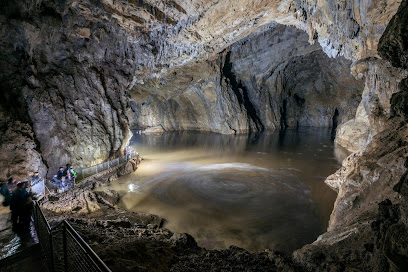
Naravni rezervat Škocjanski zatok
Explore Slovenia's Škocjanski Zatok National Reserve, an ecological haven teeming with diverse wildlife and stunning natural beauty, perfect for nature lovers.
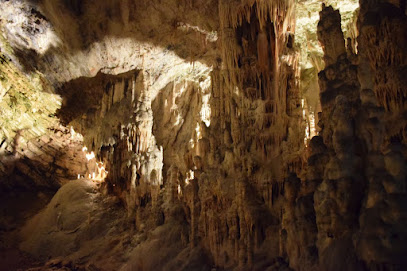
Rakov Škocjan Landscape Park
Experience the breathtaking karst landscapes of Rakov Škocjan Landscape Park, Slovenia's natural wonder filled with unique geological features and rich biodiversity.
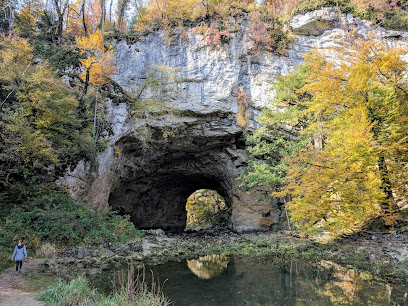
Mali naravni most
Discover the breathtaking Mali Naravni Most, a stunning natural bridge in Slovenia's Rakov Škocjan Park, perfect for nature lovers and adventure seekers alike.
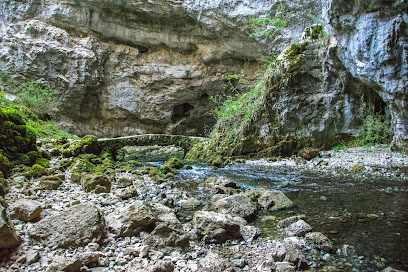
Divaška Cave
Explore the enchanting Divaška Cave, a natural wonder in Slovenia, where stunning formations and rich biodiversity await your discovery.
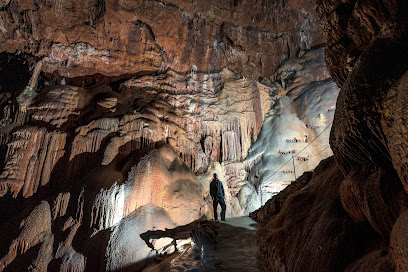
črna jama
Explore the enchanting Črna Jama in Postojna, Slovenia, where stunning underground formations and rich geological history await every visitor.
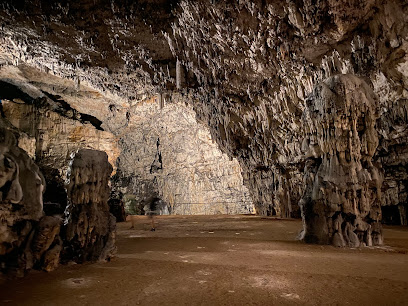
Skjocjan Cave
Discover the breathtaking beauty of Skocjan Cave in Slovenia, a UNESCO World Heritage site filled with stunning geological formations and rich biodiversity.
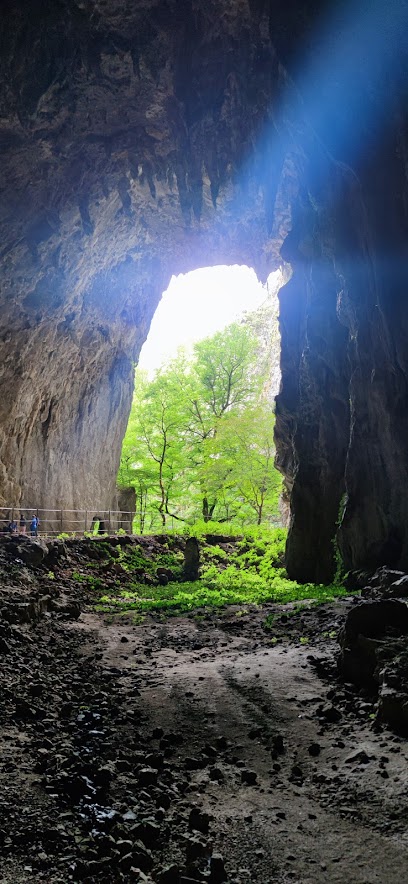
Unmissable attractions to see
Postojna Cave
Postojna Cave: A Natural Wonder of Slovenia, Home to Stunning Limestone Formations and Unique Ecosystems
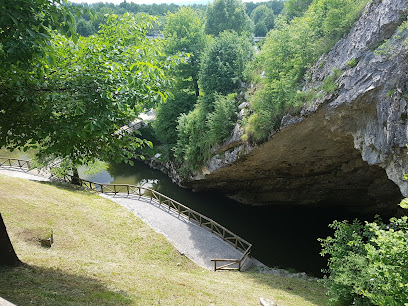
Špilja Mramornica - Grotta del Marmo
Uncover the secrets of Mramornica Cave, a stunning natural marvel rich in history and breathtaking formations in Brtonigla, Croatia.
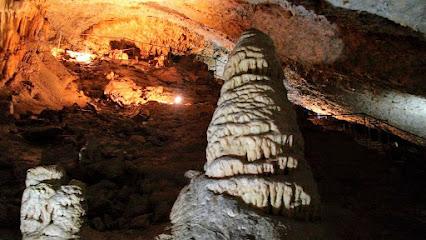
Grad Vipavski Križ
Experience the charm of Grad Vipavski Križ, a medieval castle in Slovenia offering stunning views and rich history.
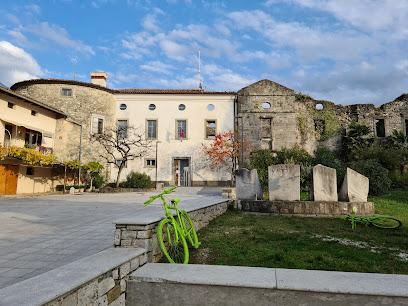
Lutheran Evangelical Church / Luternasko Evangeličanska Cerkev
Discover the serene charm and architectural beauty of the Lutheran Evangelical Church in Trieste, a spiritual and cultural gem in Italy.
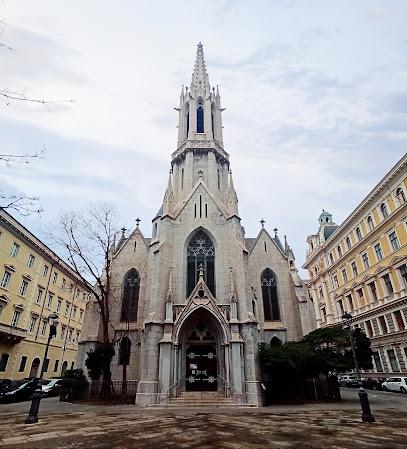
Trieste War Memorial
Explore the Trieste War Memorial, a serene tribute to valor surrounded by nature's beauty in Parco della Rimembranza.
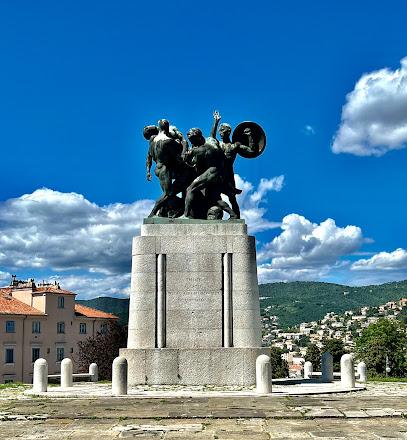
Muzej slovenskih filmskih igralcev
Explore Slovenia's film heritage at the Muzej slovenskih filmskih igralcev, where cinema comes alive through captivating exhibits and rich storytelling.
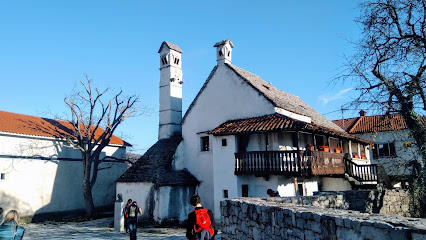
TRUFFLE MUSEUM by Karlic
Explore the captivating Truffle Museum in Buzet, Croatia, where the mystery of truffles unfolds through interactive exhibits and tastings.
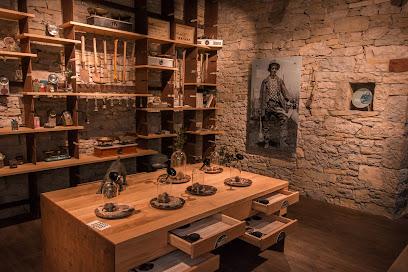
Grad Školj
Explore Grad Školj, a magnificent castle in Slovenia offering breathtaking views, rich history, and cultural experiences for every traveler.
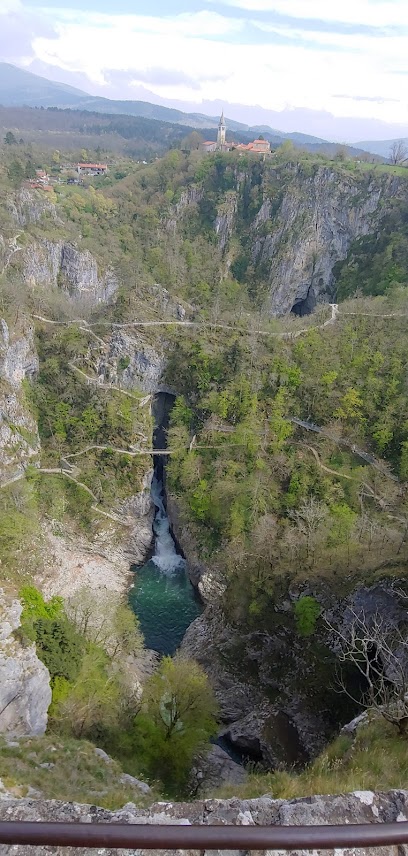
Motovun Parenzana tunnel
Explore the Motovun Parenzana Tunnel, a historical gem nestled in the heart of Istria, blending rich heritage with stunning natural beauty.
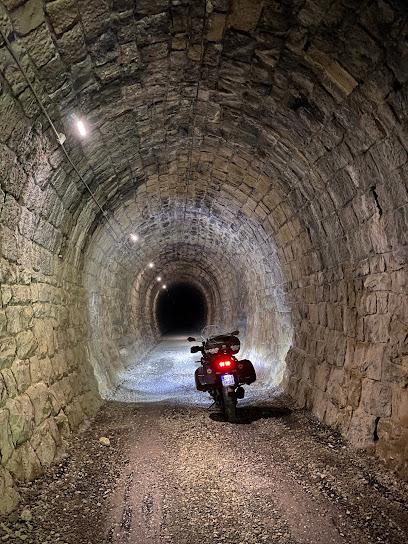
Ancient columns of San Giusto
Explore the Ancient Columns of San Giusto in Trieste, a historical gem that showcases the city's rich Roman heritage and architectural splendor.
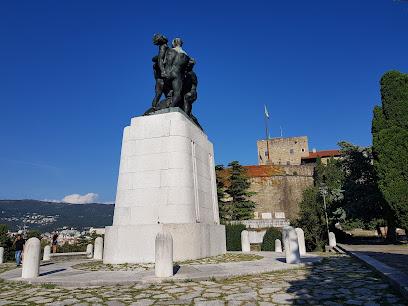
Skojcjan Caves
Explore Skocjan Caves, a UNESCO World Heritage Site in Slovenia, renowned for its breathtaking underground landscapes and rich geological history.
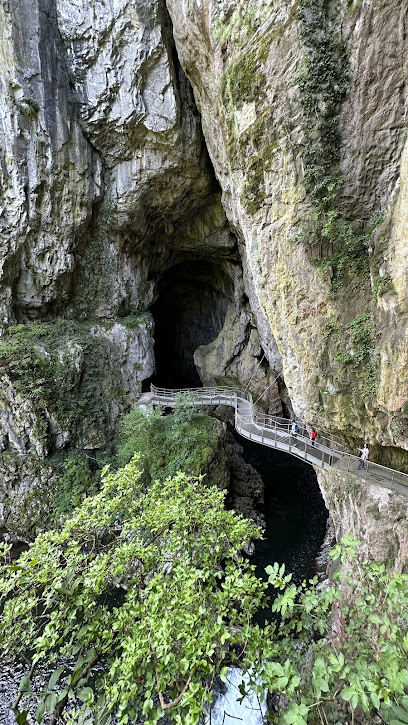
Spodmol pri Črnotičah
Explore the natural wonders of Spodmol pri Črnotičah, a breathtaking cave system in Slovenia, offering unique geological formations and stunning landscapes.
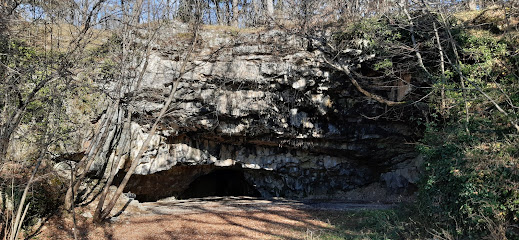
J'kopinov skedenj
Explore J'kopinov skedenj, a cultural gem in Slovenia, blending history and natural beauty in one captivating destination.
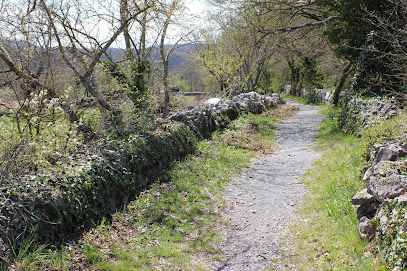
Škocjanski zatok
Explore the serene beauty of Škocjanski Zatok, a nature preserve in Slovenia teeming with wildlife and stunning landscapes, perfect for eco-tourists.
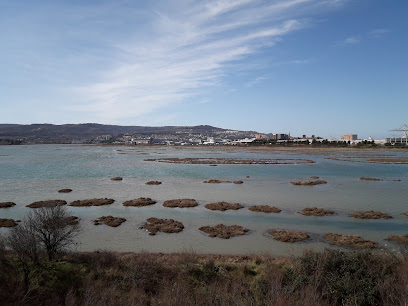
Kontovelska mlaka - Kontovel pond
Explore the serene beauty of Kontovelska Mlaka, a hidden gem in Contovello near Trieste, perfect for nature lovers and tranquility seekers.
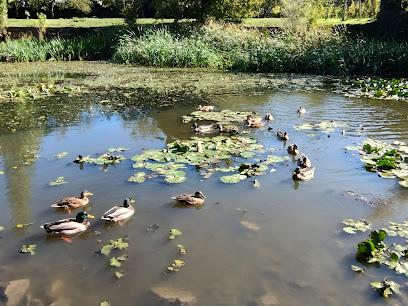
Essential places to dine
Ošterija Na Planinci
Discover Ošterija Na Planinci - where traditional Slovenian cuisine meets enchanting surroundings near Škocjan Caves.
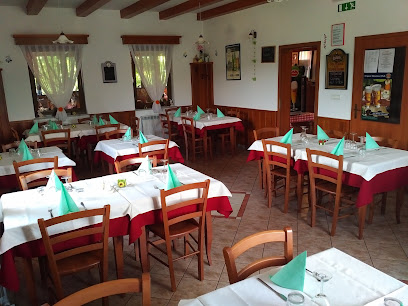
Magdalena Food & Fun
Experience delectable local and international cuisine at Magdalena Food & Fun, your perfect dining companion after exploring Postojna's stunning caves.
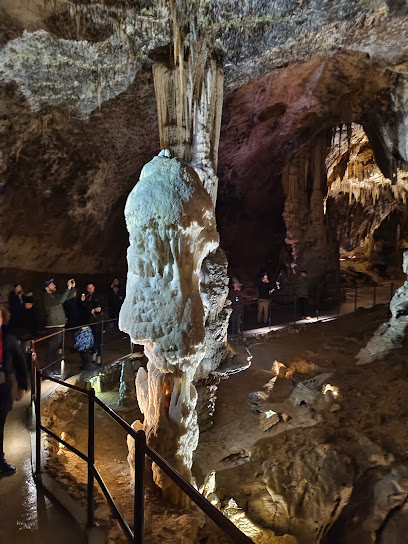
Ambrožič Restaurant
Discover authentic Slovenian cuisine at Ambrožič Restaurant in Matavun – where tradition meets taste in every dish.

Markets, malls and hidden boutiques
Skocjan Caves
Uncover the breathtaking beauty of the Skocjan Caves, a UNESCO World Heritage Site, where nature's awe-inspiring underground landscapes await.
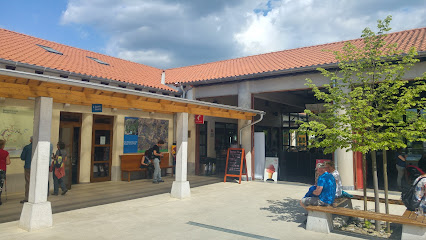
Divaška Cave
Explore the stunning Divaška Cave, a natural wonder in Slovenia, filled with breathtaking formations and rich biodiversity, perfect for nature enthusiasts.
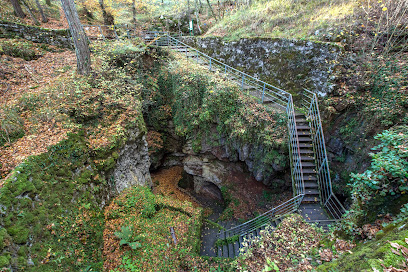
Tuš market Divača
Experience the authentic taste of Slovenia at Tuš Market Divača, where fresh local produce meets charming community spirit.
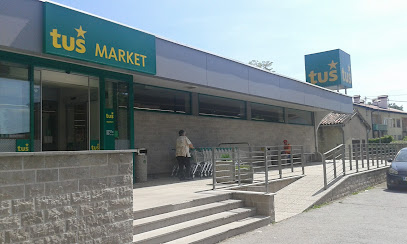
Weaver Cave
Explore the stunning limestone beauty and rich history of Weaver Cave, an enchanting natural wonder in Slovenia, perfect for adventurous souls.
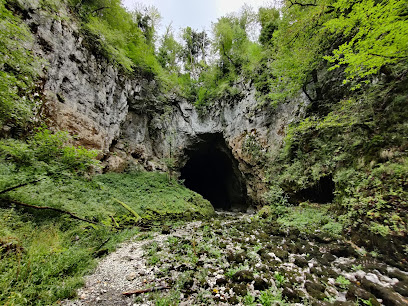
Volvo Group Trucks center Divaca
Discover the heart of automotive innovation at the Volvo Group Trucks Center in Divača—where cutting-edge technology meets rich heritage.
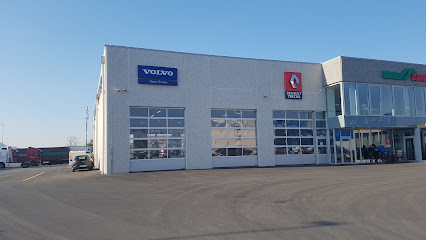
Fama d.o.o. - market Divača
Explore Fama Market in Divača for an authentic taste of Slovenia's local produce, delicacies, and culinary traditions.
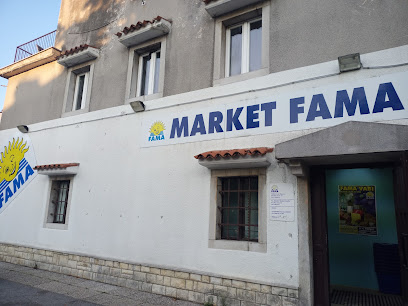
Avto-Kras, vleka in popravilo vozil, Kuharič & Co. d.n.o.
Discover reliable towing and auto repair services at Avto-Kras in Divača, Slovenia, ensuring your travels remain smooth and worry-free.
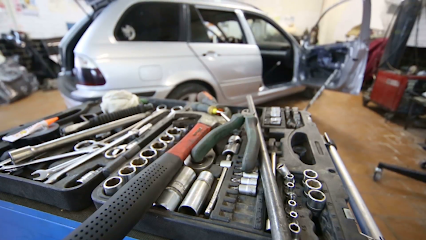
Kamnoseštvo Ražem, storitve in trgovina, d.o.o.
Explore exquisite stone craftsmanship at Kamnoseštvo Ražem, a premier lapidary workshop in Divača, Slovenia, showcasing local artistry and heritage.
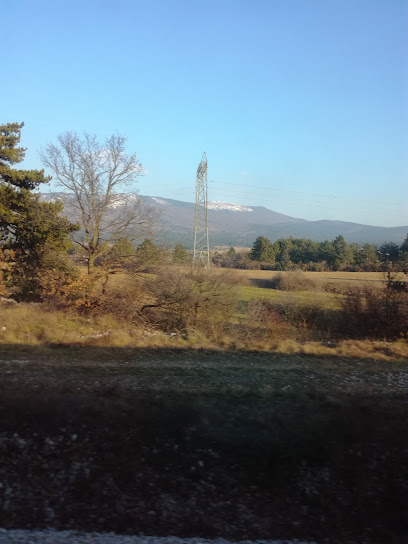
Slovarms, trgovina z orožjem in opremo za lov in prosti čas, d.o.o.
Discover Slovarms in Divača: Your go-to gun shop and outdoor sports store for all your adventure needs in Slovenia's stunning landscapes.
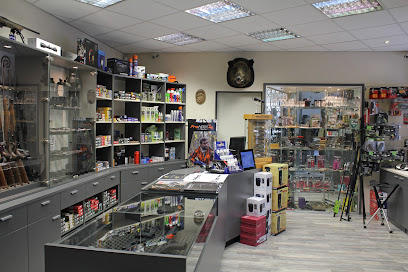
Engrotuš podjetje za trgovino, d.d.
Discover the best local and international products at Engrotuš, the favorite supermarket in Divača, Slovenia.
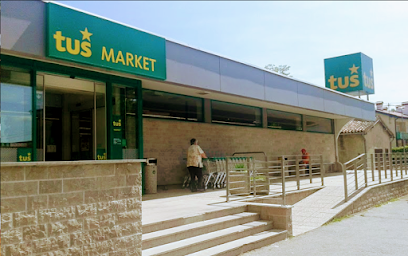
Butique Fenomen
Explore Butique Fenomen for unique clothing and fashion pieces that reflect the vibrant local culture of Zagorje ob Savi.

Unique Handmade mens Wooden Tie SWOGAR
Explore handcrafted wooden ties that redefine men's fashion at SWOGAR, where creativity meets craftsmanship in every unique piece.

Avtomak trgovina, posredništvo in vleka vozil Matej Klun s.p.
Explore Slovenia with Avtomak, your trusted car dealership in Divača offering a wide range of vehicles and exceptional service.
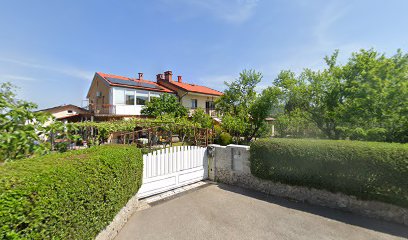
Kraške lekarne - podružnica Divača
Discover essential health solutions at Kraške lekarne in Divača, the pharmacy that cares for your well-being during your travels.
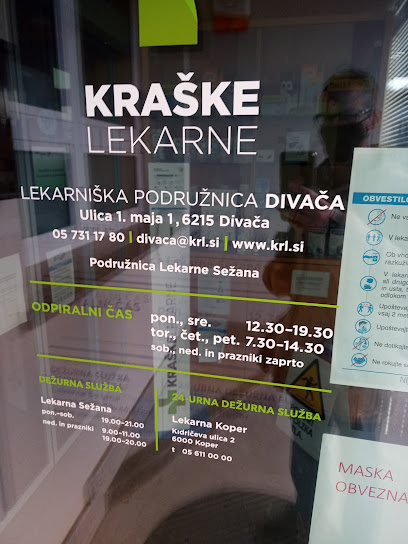
Conor's Adventure
Discover the ultimate pet shopping experience at Conor's Adventure in Divača, Slovenia, where quality meets passion for pets!
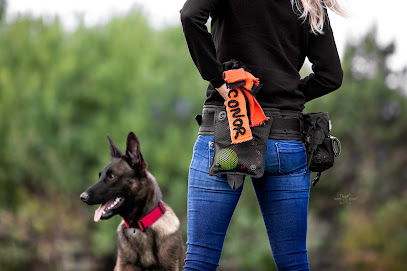
Essential bars & hidden hideouts
Ošterija Na Planinci
Discover the authentic flavors of Slovenia at Ošterija Na Planinci, a traditional restaurant and cozy bed & breakfast in Divača.
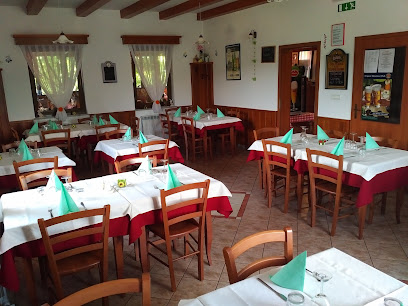
Kava bar Fontana
Discover the charm of Kava Bar Fontana in Kozina, Slovenia, where great coffee meets a cozy atmosphere, perfect for relaxation and socializing.
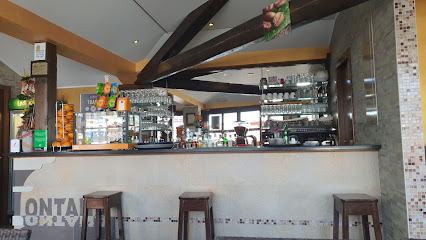
Caffè kosovel
Experience the warmth of Slovenian hospitality at Caffè Kosovel, where delightful coffee and a vibrant atmosphere await.
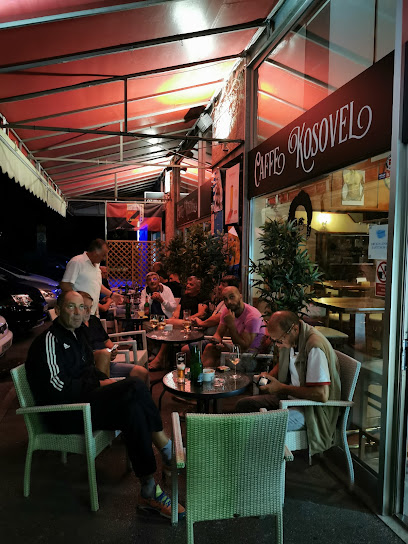
Ambrožič Restaurant
Discover the authentic taste of Slovenia at Ambrožič Restaurant, where tradition meets flavor in a charming countryside setting.
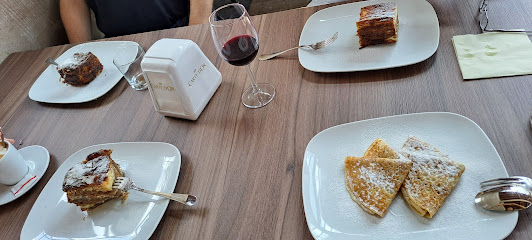
Nane bar, Milan Ceglar s.p.
Discover the charm of Nane Bar in Kozina, where cozy ambiance meets delightful drinks and local flavors.
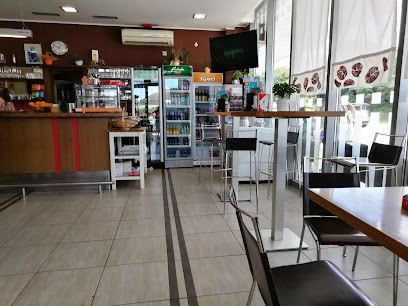
Bar Malnar, strežba pijač, Larisa Škerjanc s.p.
Discover the charm of Kozina at Bar Malnar, where delightful beverages meet a welcoming atmosphere in the heart of Slovenia.
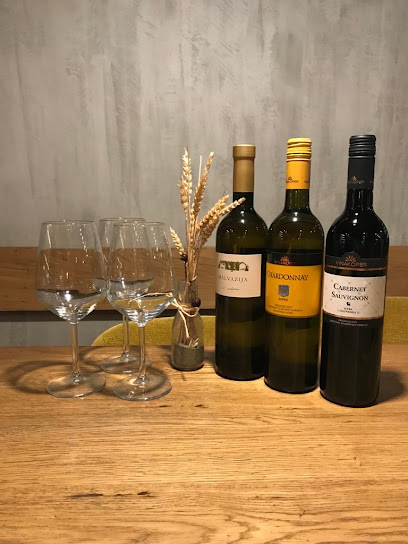
Bar Gabriela Gabrijela Vivian Weber s.p.
Experience the warm hospitality and delightful drinks at Bar Gabriela in Sežana, a must-visit spot for every traveler.
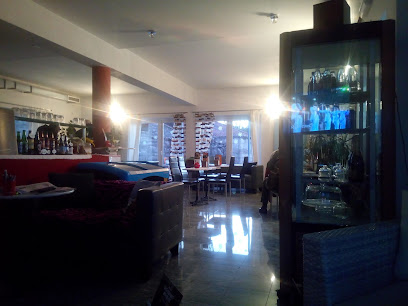
Moj Bar
Discover Moj Bar in Sežana: A charming cafe and beer hall offering local drinks, cozy ambiance, and delightful snacks for a memorable experience.
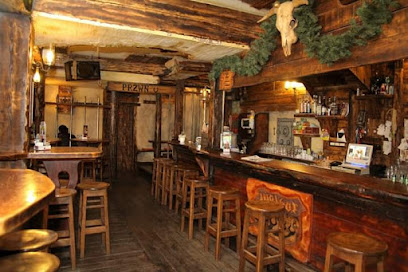
Dark Volvo Bar
Experience the vibrant atmosphere of Dark Volvo Bar in Divača, Slovenia - the perfect place to unwind with friends and enjoy quality drinks.
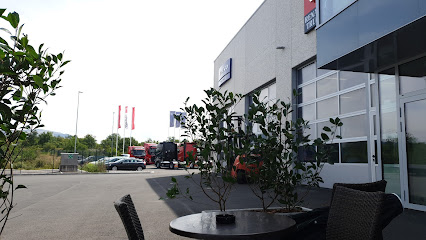
Šen bar
Discover Šen Bar: A lively hub in Kozina, offering delightful drinks and a welcoming atmosphere for all visitors.
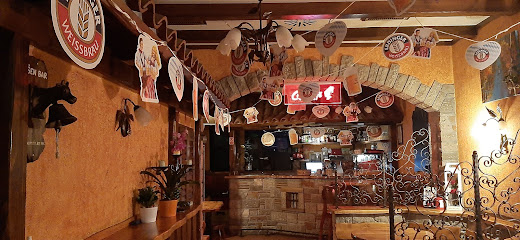
Itak bar, Danijel Stjepanović s.p.
Discover the enchanting Itak Bar in Divača, where exceptional drinks meet a warm, inviting atmosphere, ideal for relaxation and socializing.
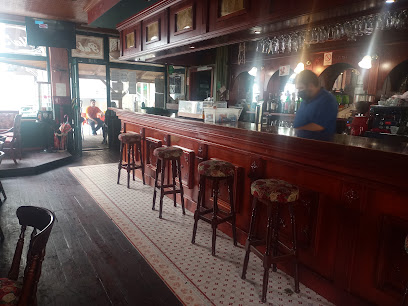
Chuchi bar, Darija Kukec s.p.
Discover Chuchi Bar in Sežana: A cozy retreat for local drinks, friendly vibes, and unforgettable memories.
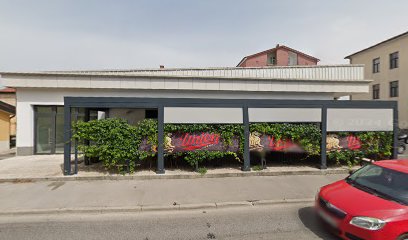
BAR ROVNA, BSK ELITE INTERNATIONAL d.o.o.
Discover the charm of Bar Rovna in Sežana, Slovenia, where local drinks and a cozy atmosphere await every traveler.
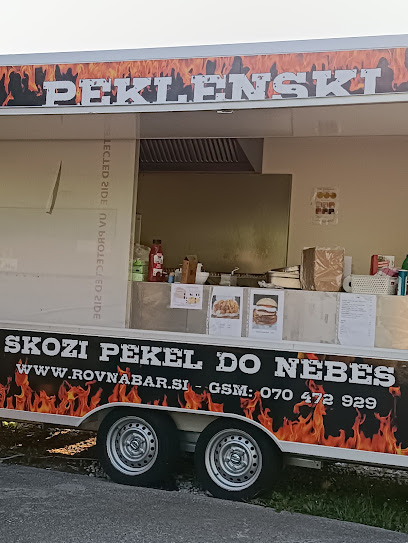
Skjocjan Cave
Explore Skocjan Cave, a UNESCO World Heritage site in Slovenia, known for its stunning underground landscapes and rich natural history.
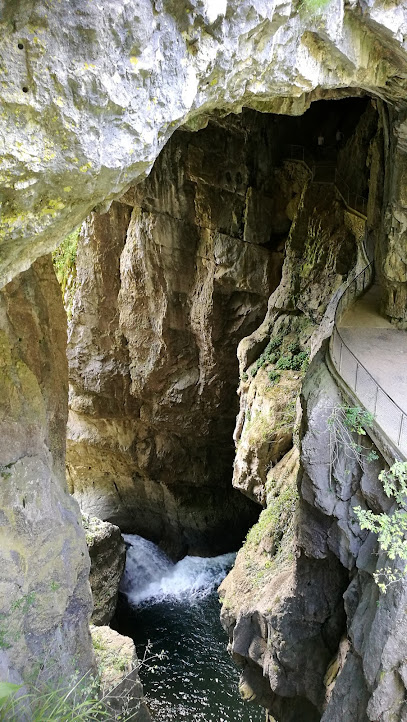
Local Phrases about Škocjan Caves
-
- HelloZdravo
[Zdrah-voh] - GoodbyeNasvidenje
[Nah-svee-deh-nyeh] - YesJa
[Yah] - NoNe
[Neh] - Please/You're welcomeProsim
[Proh-seem] - Thank youHvala
[Hvah-lah] - Excuse me/SorryOprostite
[Oh-proh-stee-teh] - How are you?Kako ste?
[Kah-koh steh?] - Fine. And you?V redu. In vi?
[V reh-doo. Een vee?] - Do you speak English?Govorite angleško?
[Go-vo-ree-te ahn-gleh-shko?] - I don't understandNe razumem
[Neh rah-zoo-mehm]
- HelloZdravo
-
- I'd like to see the menu, pleaseŽelel(a) bi videti jedilnik, prosim
[Zheh-lel(ah) bee vee-deh-tee yeh-deel-neek, proh-seem] - I don't eat meatNe jem mesa
[Neh yem meh-sah] - Cheers!Na zdravje!
[Nah zdrahv-yeh!] - I would like to pay, pleaseŽelim plačati, prosim
[Zheh-leem plah-cha-tee, proh-seem]
- I'd like to see the menu, pleaseŽelel(a) bi videti jedilnik, prosim
-
- Help!Pomoč!
[Poh-moh-ch!] - Go away!Pojdite stran!
[Poy-dee-teh strahn!] - Call the Police!Pokličite policijo!
[Poh-klee-chee-teh po-lee-tsee-yo!] - Call a doctor!Pokličite zdravnika!
[Poh-klee-chee-teh zdrahv-nee-kah!] - I'm lostIzgubil(a) sem se
[Eez-goo-beel(ah) sem seh] - I'm illBol(a)an sem
[Boh-lah-ahn sem]
- Help!Pomoč!
-
- I'd like to buy...Želel(a) bi kupiti...
[Zheh-lel(ah) bee koo-pee-tee...] - I'm just lookingSamo se ogledujem
[Sah-moh seh oh-gleh-doo-yem] - How much is it?Koliko stane?
[Koh-lee-koh stah-neh?] - That's too expensiveTo je predrago
[Toh yeh preh-drah-goh] - Can you lower the price?Lahko znižate ceno?
[Lah-koh znee-zah-teh cheh-no?]
- I'd like to buy...Želel(a) bi kupiti...
-
- What time is it?Koliko je ura?
[Koh-lee-koh yeh oo-rah?] - It's one o'clockJe ena ura
[Yeh eh-na oo-rah] - Half past (10)Pol desetih
[Pohl deh-seh-teeh] - MorningJutro
[Yoo-troh] - AfternoonPopoldne
[Poh-pohl-dneh] - EveningVečer
[Veh-chehr] - YesterdayVčeraj
[V-cheh-rye] - TodayDanes
[Dah-nes] - TomorrowJutri
[Yoo-tree] - 1Ena
[Eh-na] - 2Dva
[Dvah] - 3Tri
[Tree] - 4Štiri
[Shtee-ree] - 5Pet
[Peht] - 6Šest
[Shest] - 7Sedem
[Seh-dehm] - 8Osem
[Oh-sehm] - 9Devet
[Deh-veht] - 10Deset
[Deh-seht]
- What time is it?Koliko je ura?
-
- Where's a/the...?Kje je...
[Kyeh yeh...] - What's the address?Kateri je naslov?
[Kah-teh-ree yeh nah-slohv?] - Can you show me (on the map)?Mi lahko pokažete (na zemljevidu)?
[Mee lah-koh poh-kah-zheh-teh (nah zehm-lye-vee-doo)?] - When's the next (bus)?Kdaj je naslednji (avtobus)?
[Kdy-ee yeh nah-slehd-nyee (ow-toh-boos)?] - A ticket (to ....)Vstopnico (za ....)
[Vstohp-nee-tso (zah ....)]
- Where's a/the...?Kje je...
History of Škocjan Caves
-
The Škocjan Caves have been a site of human activity since prehistoric times. Archaeological findings reveal that the caves were inhabited as early as the Neolithic period. Various artifacts, including pottery and tools, have been discovered, indicating that prehistoric people used the caves for shelter and ritualistic purposes.
-
During the Roman era, the Škocjan Caves were known to local inhabitants and possibly used as a refuge. Roman artifacts, such as coins and ceramics, have been found in the area, suggesting that the caves held some significance during this period.
-
The first written records mentioning the Škocjan Caves date back to medieval times. Documents from the 12th century refer to the caves as a notable geographic feature. These early references highlight the caves' long-standing presence in the local cultural landscape.
-
The Škocjan Caves gained significant attention in the 19th century with the rise of scientific exploration. In 1823, the caves were thoroughly explored by Friedrich Adolf Schmidl, a pioneering speleologist. His detailed maps and descriptions brought the caves to the attention of the scientific community and the general public.
-
By the late 19th century, Škocjan Caves became a popular destination for tourists. The first guided tours were organized, and basic infrastructure, such as trails and lighting, was developed to accommodate visitors. This period marked the beginning of the caves' transformation into a major tourist attraction.
-
In 1986, the Škocjan Caves were inscribed on the UNESCO World Heritage List. This recognition was due to their exceptional natural beauty and geological significance. The caves are renowned for their vast underground chambers, rich biodiversity, and unique karst formations.
-
In recent decades, significant efforts have been made to preserve the Škocjan Caves and their surrounding ecosystem. Conservation projects aim to protect the delicate karst environment and ensure sustainable tourism practices. These initiatives help maintain the caves' natural and cultural heritage for future generations.
Škocjan Caves Essentials
-
Škocjan Caves are located in the southwestern part of Slovenia. The nearest international airport is Ljubljana Jože Pučnik Airport, approximately 90 kilometers away. From Ljubljana, you can take a direct train to Divača, which is the nearest town to Škocjan Caves. The train journey takes around 1.5 hours. Alternatively, you can rent a car and drive to Divača, which will take about an hour. There are also bus services available from Ljubljana to Divača.
-
Once in Divača, you can reach Škocjan Caves by a local shuttle bus, taxi, or even a scenic 45-minute walk. Car rentals are also available in Divača for those who prefer to explore the area at their own pace. For those using public transport, the local shuttle bus from Divača to Škocjan Caves operates regularly during peak tourist seasons.
-
The official currency in Slovenia is the Euro (EUR). Credit cards are widely accepted in hotels, restaurants, and larger shops. However, it is advisable to carry some cash, especially for smaller establishments and for purchasing tickets at the caves. ATMs are available in Divača for withdrawing cash if needed.
-
Škocjan Caves and the surrounding area are generally safe for tourists. Standard precautions should be taken, such as keeping an eye on personal belongings and avoiding solitary walks at night in unfamiliar areas. There are no specific high-crime areas targeting tourists in this region, but staying vigilant is always advisable.
-
In case of emergency, dial 112 for immediate assistance, which covers medical, fire, and police emergencies. The local police station and medical facilities are available in Divača. It is recommended to have travel insurance that covers medical emergencies. For minor health issues, there are pharmacies in Divača where you can purchase over-the-counter medications.
-
Fashion: Do wear comfortable shoes and clothing suitable for walking and exploring caves. Don't wear high heels or flip-flops as the cave paths can be slippery. Religion: Do respect local customs and traditions. Public Transport: Do be respectful to fellow passengers and give up your seat to elderly passengers. Don't eat or drink on public transport. Greetings: Do greet people with a friendly 'Dober dan' (Good day). Shaking hands is also common. Eating & Drinking: Do try local delicacies and accept food offerings graciously. Don’t refuse hospitality, as it is considered impolite.
-
To experience Škocjan Caves like a local, consider visiting during the off-peak season to avoid large crowds. Join a guided tour to gain in-depth knowledge about the caves' history and geology. Don't miss the chance to explore the Škocjan Education Trail, which offers a fantastic overview of the area’s natural beauty and cultural heritage. Lastly, engaging with local guides and staff can provide unique insights and enhance your visit.
Nearby Cities to Škocjan Caves
-
Things To Do in Trieste
-
Things To Do in Postojna
-
Things To Do in Koper
-
Things To Do in Izola
-
Things To Do in Portorož
-
Things To Do in Piran
-
Things To Do in Nova Gorica
-
Things To Do in Opatija
-
Things To Do in Ljubljana
-
Things To Do in Škofja Loka
-
Things To Do in Bohinj
-
Things To Do in Rovinj
-
Things To Do in Kamnik
-
Things To Do in Bled
-
Things To Do in Pula








